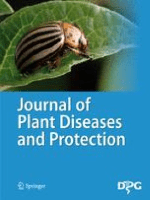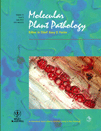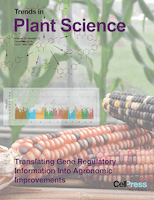
PHYTOPATHOLOGY
metrics 2024
Pioneering research in plant disease management.
Introduction
PHYTOPATHOLOGY, published by the American Phytopathological Society, is a premier journal dedicated to advancing the science of plant pathology. With an ISSN of 0031-949X and E-ISSN 1943-7684, this journal has been a cornerstone of scholarly communication in the field since its inception in 1946. Ranked in the top quartile (Q1) in both Agronomy and Crop Science and Plant Science for 2023, PHYTOPATHOLOGY has garnered notable recognition with Scopus ranks placing it at #86/516 (83rd percentile) in Plant Science and #69/406 (83rd percentile) in Agronomy and Crop Science. The journal publishes high-quality research articles, reviews, and case studies that explore innovative solutions to plant diseases, thereby supporting agricultural productivity and sustainability. While currently not an open-access journal, it offers vital insights and findings that are invaluable to researchers, professionals, and students aiming to advance their knowledge and contribute to the field of plant sciences.
Metrics 2024
 0.78
0.78 2.60
2.60 3.30
3.30 150
150Metrics History
Rank 2024
Scopus
IF (Web Of Science)
JCI (Web Of Science)
Quartile History
Similar Journals

Journal of Plant Diseases and Protection
Unveiling Solutions for Plant ProtectionThe Journal of Plant Diseases and Protection, published by SPRINGER HEIDELBERG in Germany, is a premier platform for the dissemination of cutting-edge research in the fields of Agronomy, Horticulture, and Plant Science. With its Q2 ranking in multiple categories as of 2023, this journal stands out in the academic landscape, highlighting its strong performance with a notable Scopus rank of 22nd in Horticulture and placing in the top percentile for Agronomy and Plant Science. The journal spans from 2006 to 2024, making it a valuable resource for researchers, professionals, and students seeking to stay abreast of advancements in the understanding of plant diseases and their protection. The Open Access options further enhance its accessibility, fostering a global exchange of knowledge essential for addressing contemporary agricultural challenges.

MOLECULAR PLANT PATHOLOGY
Elevating the science of plant protection.MOLECULAR PLANT PATHOLOGY, published by Wiley, is a leading academic journal in the fields of Agronomy, Molecular Biology, Plant Science, and Soil Science, with a strong reputation underscored by its impressive Q1 rankings across multiple categories and a Scopus rank placing it in the top echelons of its fields. Since embracing Open Access in 2019, this journal has significantly broadened its reach, enhancing visibility and accessibility for researchers, professionals, and students alike. With a commitment to publishing high-quality, innovative research, MOLECULAR PLANT PATHOLOGY serves as a critical platform for advancing our understanding of plant diseases and pathogenesis, contributing to the development of sustainable agricultural practices. As a vital resource for scholarly communication, it fosters collaboration among scientists and supports the sharing of vital knowledge that addresses issues of global food security and environmental health.

EUROPEAN JOURNAL OF PLANT PATHOLOGY
Connecting science and sustainability in agriculture.The EUROPEAN JOURNAL OF PLANT PATHOLOGY, published by SPRINGER, is a leading academic journal dedicated to advancing the understanding of plant pathology within the fields of Agronomy, Horticulture, and Plant Science. With an ISSN of 0929-1873 and an E-ISSN of 1573-8469, this journal has established its presence since its inception in 1994 and continues to serve as an essential resource for researchers, professionals, and students through 2024. The journal is ranked in the Q2 category in multiple scholarly domains and boasts impressive Scopus rankings, placing it in the 80th percentile for Horticulture and 69th percentile for Plant Science. Notably, it facilitates the dissemination of cutting-edge research and reviews that address critical challenges in plant health, disease management, and sustainable agricultural practices. Although the journal is not Open Access, it provides vital insights and contributes significantly to the scientific community, fostering collaboration and innovation in plant pathology.

JOURNAL OF PLANT PATHOLOGY
Uncovering the Secrets of Plant DiseasesJOURNAL OF PLANT PATHOLOGY, published by SPRINGER, is a premier academic journal dedicated to advancing the understanding of phytopathology and related fields. With a strong international presence and an impact factor that reflects its influence in the scientific community, this journal offers essential insights to researchers, professionals, and students engaged in plant health. Since its inception in 1997, it has consistently provided a platform for innovative research, contributing to the Q2 rank in Plant Science as per the 2023 category quartiles. The journal covers a broad spectrum of topics related to plant diseases, their management, and the ecological impacts they pose, ensuring relevance to contemporary challenges in agriculture and sustainability. While the journal does not currently offer Open Access options, it remains a crucial resource for those looking to deepen their knowledge and bolster their research endeavors in the vital area of plant pathology.

Phytopathology Research
Fostering inclusive research in the realm of phytopathology.Phytopathology Research, published by SPRINGERNATURE, serves as a vital resource in the rapidly evolving fields of biochemistry, genetics, molecular biology, and plant sciences. Since adopting an open access model in 2019, this journal has fostered an inclusive approach to disseminating cutting-edge research and breakthroughs in plant pathology and related disciplines. With an impressive impact factor in the second quartile for Biochemistry, Genetics and Molecular Biology (miscellaneous) and Plant Science, and a robust standing in the Scopus rankings, it attracts high-quality contributions from researchers around the globe. The journal not only supports the academic community's quest for advanced knowledge but also plays a crucial role in addressing global agricultural challenges through innovative research. Positioned in the United Kingdom and operating with a keen focus on enhancing plant health and resistance, Phytopathology Research continues to be an essential platform for both established and emerging scientists in this vital area of study.

Annual Plant Reviews Online
Bridging Theory and Practice in Plant StudiesAnnual Plant Reviews Online, published by WILEY, serves as a premier academic resource dedicated to the evolving field of plant sciences, including specialties in agronomy, horticulture, and food science. With an impressive Q1 ranking in Horticulture and Q2 classifications in Agronomy, Crop Science, and Plant Science, this journal reflects a high standard of scholarly contribution, evidenced by its positioning in the 75th percentile range among agricultural and biological sciences in leading Scopus rankings. Aimed at researchers, professionals, and students alike, the journal covers a broad spectrum of plant-related topics and trends, aiming to enhance the understanding of plant biology and its applications. Offering timely insights and critical reviews, Annual Plant Reviews Online connects the global community with essential knowledge, supporting advancements in sustainable practices and innovations in agriculture. Researchers and students can access its content seamlessly, contributing to ongoing discussions in plant science and fostering academic growth.

Annual Review of Phytopathology
Illuminating trends in plant science and medicine.Annual Review of Phytopathology, published by ANNUAL REVIEWS, is an esteemed journal that has been at the forefront of the field since its inception in 1973. With a focus on both Plant Science and Medicine, the journal holds a prestigious Q1 ranking in both categories for 2023, reflecting its influence and significance in the academic community. The journal features comprehensive review articles that encapsulate significant advancements and emerging trends in phytopathology, providing valuable insights for researchers, professionals, and students alike. Its rigorous peer-review process ensures the highest quality of publication, making it essential for anyone seeking to stay informed on critical issues affecting plant health and related disciplines. With an impressive Scopus ranking of #10 out of 516 in Agricultural and Biological Sciences, Annual Review of Phytopathology remains a vital resource for the dissemination of cutting-edge knowledge, fostering innovation and collaboration within the field.

ARCHIVES OF PHYTOPATHOLOGY AND PLANT PROTECTION
Exploring the Frontiers of Agronomy and Crop ScienceArchives of Phytopathology and Plant Protection, published by Taylor & Francis Ltd, stands as a pivotal platform in the field of agronomy and crop science since its inception in 1974. With an ISSN of 0323-5408 and E-ISSN of 1477-2906, this journal is dedicated to publishing high-quality, peer-reviewed research that addresses contemporary challenges in plant pathology and protection. As a Q3 ranked journal in its category with Scopus Rank #210/406, it serves a vital role in disseminating practical solutions and innovative discoveries to enhance agricultural productivity and sustainability. The journal fosters a rich exchange of ideas among researchers, professionals, and students, empowering them to contribute to the advancement of the agronomy and biological sciences. Despite being traditionally subscription-based, the journal's commitment to comprehensive and rigorous research makes it an essential resource for anyone invested in the future of plant health and agricultural innovation.

Australasian Plant Disease Notes
Pioneering Research for Sustainable AgricultureAustralasian Plant Disease Notes is a vital resource in the fields of Agronomy and Plant Science, published by SPRINGER. Established to address the increasing need for research dissemination on plant diseases in the Australasian region, the journal focuses on the sharing of innovative findings and methodologies pertinent to plant health and pathology. With an ISSN of 1833-928X and E-ISSN 1833-928X, this journal serves as an open platform for researchers to contribute original research, case studies, and reviews that enhance our understanding of plant diseases. Recognized in the academic community, it achieved a Q3 ranking in both Agronomy and Plant Science categories as of 2023, indicating its relevance and significance in the field. The journal aims to support researchers, professionals, and students by providing access to critical insights that can drive advancements in agricultural practices and plant conservation efforts. With a convergence of knowledge spanning from 2009 to 2024, Australasian Plant Disease Notes is poised to make a lasting impact in the study of plant health.

TRENDS IN PLANT SCIENCE
Pioneering Trends for a Greener TomorrowTRENDS IN PLANT SCIENCE is a premier academic journal published by CELL PRESS, dedicated to advancing the field of plant sciences. With an ISSN of 1360-1385 and E-ISSN 1878-4372, this journal has established itself as a critical resource for researchers and practitioners alike, boasting a remarkable impact factor that places it in the Q1 quartile for plant science in the 2023 rankings. Featuring a comprehensive scope that encompasses emerging trends, innovative research, and pivotal reviews in the plant sciences, it aims to promote interdisciplinary dialogue and encourage progressive research methodologies. Hailing from the United Kingdom, TRENDS IN PLANT SCIENCE serves a global community of over 516 journals, achieving a top-tier ranking of 3rd in the Scopus ranking for Agricultural and Biological Sciences. This makes the journal an indispensable asset for anyone aiming to keep abreast of the latest developments in plant biology and its applications. As we look towards its future converging years from 1996 to 2024, the journal continues to foster scholarly excellence and innovation in the field.